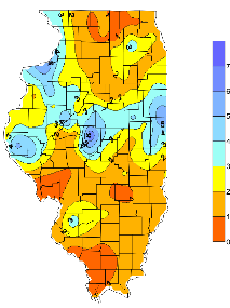|
"Double-digit
days of temperatures above 90 were quite common, with 15 to 20 days
(south), 10 to 20 days (central), and 10 to 15 days (north)," says
Jim Angel, state climatologist with the
Illinois State Water Survey, a
division of the Illinois Department of Natural Resources. Statewide
temperatures averaged 78.1 degrees — 2.4 degrees above normal.
Chicago especially
struggled with hot weather in July due to the urban heat island.
Within the urban area, Midway Airport reported 22 days of 90-plus
temperatures, while O’Hare Airport to the west reported only 12 such
days. Twenty-six of the 30 heat-related deaths in Cook County this
summer were reported during July, according to the Cook County
medical examiner’s office.
Grand Tower reported
the warmest temperature for July, 103 degrees on July 10, and
McHenry reported the coldest temperature, 47 degrees on July 14.
The largest one-day
total rainfall was at Piper City, 4.32 inches on July 29. Aledo
reported the largest monthly total rainfall, 8.30 inches.
"While parts of
Illinois received heavy rains in July, these rains were not
widespread," says Angel. "Rainfall that occurred was confined
largely to western Illinois between the Wisconsin border and Quincy
and extending eastward in a narrow band across central Illinois.
(See map.)
[to top of second column in this
article]
|

July 2002 precipitation (inches)
[Click on map to enlarge]
"Substantial portions
of northern and southern Illinois had less than 2 inches rather than
the nearly 4 inches they normally receive in July. As a result, corn
and soybeans in areas that received rain are doing much better than
those in areas that received little or no rain."
"Remember to drink
lots of fluids and try to keep cool, but don’t expect relief any
time soon," cautions Angel.
National Weather Service forecasts are
calling for another two weeks of warm, dry conditions.
[Illinois State Water
Survey press release] |
|
"Home repair fraud is consistently the
number one consumer complaint," said Bomke, R-Springfield. "It’s
important know your rights before beginning any remodeling project
so you don’t willing become a victim of fraud."
Bomke points to a 2000 law requiring
contractors to provide customers with a copy of the brochure "Home
Repair: Know Your Consumer Rights."
"Homeowners have rights when hiring a
contractor for repair and improvements projects. Knowing these
rights can make all the difference," said Bomke.
For example, on jobs totaling more than
$1,000, contractors must also provide a written contract signed by
both the contractor and the customer. They must also carry insurance
for any damage that may occur during the remodeling.
Several common-sense tips will also
help alert a homeowner to a possible scam:
• Ask friends and family
for recommendations of contractors they trust.
• Get references.
• Collect several
estimates in writing.
• Beware of prices that
seem too good to be true.
• Find out how long the
contractor has been in business. Check old phone books.
 [to top of second column in this
article]
|

• Be sure to see the
contractor’s license.
• Read over the contract
carefully. Look for specific start and completion dates, material
warranties, and total cost. Ask if there is a charge for an
estimate.
• Get lien waivers to
prevent claims against you or your property if the contractor fails
to pay subcontractors.
• Don’t make the final
payment until you are satisfied and all subcontractors have been
paid.
Bomke indicates homeowners should also
be suspicious of unsolicited salespeople, companies who list only a
phone number or post office box, those who refuse to provide
references, and those who fail to provide the required brochure.
While they may be on the level, these are indicators that alert you
to double-check references and make sure you are dealing with a
reputable contractor.
Copies of the brochure and these tips
may also be downloaded at
http://www.senategop.state.il.us/
Brochures/home.pdf.
[The
brochure
is in Adobe Acrobat. Click
here to download Adobe Acrobat reader.]
Homeowners
who think they have been defrauded by a contractor or have other
questions, should contact their local state’s attorney or the
Illinois attorney general’s office at (800) 243-0618 or TTY (877)
844-5461.
[News
release]
|